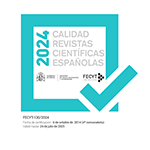An episode of biblical exegesis in 15th century Castile: Alfonso de Cartagena and his Apologia
Abstract
Alfonso de Cartagena cultivated biblical hermeneutic: he wrote his Apologia super psalmo “Iudica me, Deus” probably at the request of Pedro Fernández de Velasco, conde de Haro, after 1442. He took over the principles which led the hermeneutic of his father, Pablo de Santa María: literalism and deep christological inspiration. He developed a reading, which is focused on Christ, on the basis of figural interpretation. But instead of anti-jewish polemic, he proposed an eucharistic interpretation. He developed a reading which is based on a strong literal ground and on thomistic doctrine. He illustrated the biblical text by means of the Summa theologiae.
Downloads
Article download
License
In order to support the global exchange of knowledge, the journal Cuadernos de Filología Clásica. Estudios latinos is allowing unrestricted access to its content as from its publication in this electronic edition, and as such it is an open-access journal. The originals published in this journal are the property of the Complutense University of Madrid and any reproduction thereof in full or in part must cite the source. All content is distributed under a Creative Commons Attribution 4.0 use and distribution licence (CC BY 4.0). This circumstance must be expressly stated in these terms where necessary. You can view the summary and the complete legal text of the licence.








